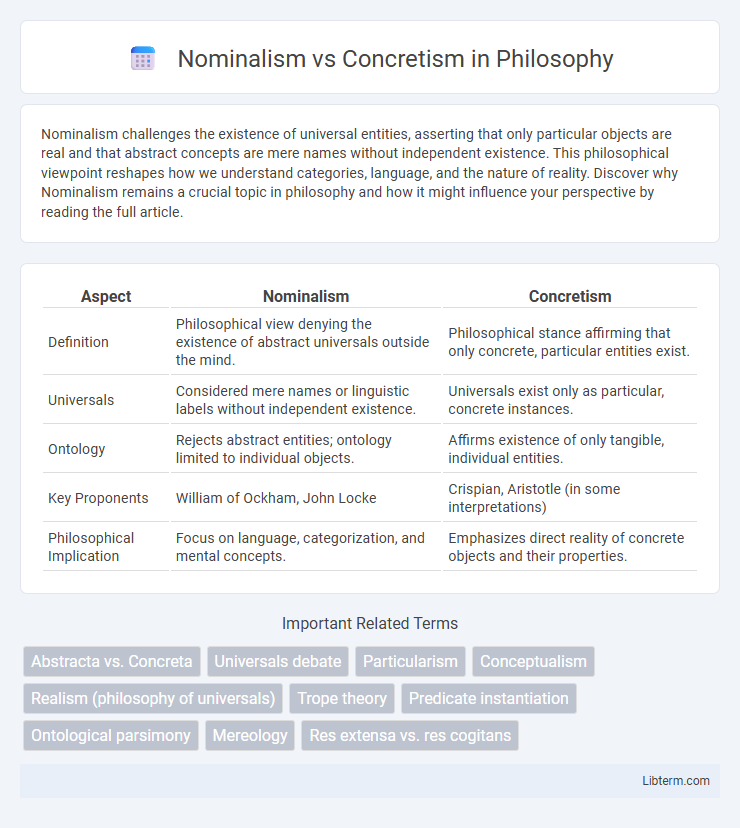Nominalism challenges the existence of universal entities, asserting that only particular objects are real and that abstract concepts are mere names without independent existence. This philosophical viewpoint reshapes how we understand categories, language, and the nature of reality. Discover why Nominalism remains a crucial topic in philosophy and how it might influence your perspective by reading the full article.
Table of Comparison
| Aspect | Nominalism | Concretism |
|---|---|---|
| Definition | Philosophical view denying the existence of abstract universals outside the mind. | Philosophical stance affirming that only concrete, particular entities exist. |
| Universals | Considered mere names or linguistic labels without independent existence. | Universals exist only as particular, concrete instances. |
| Ontology | Rejects abstract entities; ontology limited to individual objects. | Affirms existence of only tangible, individual entities. |
| Key Proponents | William of Ockham, John Locke | Crispian, Aristotle (in some interpretations) |
| Philosophical Implication | Focus on language, categorization, and mental concepts. | Emphasizes direct reality of concrete objects and their properties. |
Introduction to Nominalism and Concretism
Nominalism asserts that universals and general concepts are mere names without any corresponding reality, emphasizing that only particular objects exist independently. Concretism, conversely, maintains that universals exist concretely within individual things rather than as abstract entities. This debate fundamentally shapes metaphysical discussions on the nature of reality and the relationship between language, thought, and existence.
Historical Origins of Nominalism
Nominalism originated in the late medieval period, primarily associated with thinkers like William of Ockham who rejected the existence of universal forms outside the mind. This philosophical position emerged as a response to Scholastic realism, emphasizing that only particular objects exist and universals are mere names or linguistic constructs. The historical context of the 14th century's intellectual debates on metaphysics and epistemology significantly shaped nominalist thought.
Emergence and Principles of Concretism
Nominalism denies the existence of universals, asserting that only individual objects exist, while Concretism holds that universals emerge from concrete particulars as real entities grounded in experience. The emergence in Concretism involves the principle that universals are not abstract entities but real patterns or structures instantiated within multiple particulars. Concretism's principles emphasize that universals arise from the relational properties and interactions of concrete objects, bridging the gap between abstract concepts and tangible reality.
Key Philosophical Differences
Nominalism asserts that universals are mere names without independent existence, emphasizing individual, concrete objects as the only reality. Concretism, also known as moderate realism, holds that universals exist but only within particular instances, not as separate entities. This key philosophical difference centers on the ontological status of universals: Nominalism denies their real existence beyond language, whereas Concretism affirms their embedded reality in concrete particulars.
Nominalism in Contemporary Thought
Nominalism in contemporary thought emphasizes the rejection of abstract universals, arguing that only particular objects and individual entities exist independently. This perspective influences fields such as philosophy of language, metaphysics, and cognitive science by prioritizing concrete particulars over abstract concepts. Prominent philosophers like Nelson Goodman and Hartry Field have advanced nominalist frameworks to address issues related to reference, classification, and ontology.
Concretism’s Philosophical Impact
Concretism emphasizes the reality of individual, particular objects rather than abstract universals, challenging traditional metaphysical views on existence. This perspective influenced modern epistemology by promoting empirical observation and rejecting the notion of inherent universals, reshaping debates in ontology and the philosophy of language. Concretism's impact is evident in the development of nominalist theories and the shift towards a more scientific and pragmatic understanding of reality.
Influential Advocates and Critics
William of Ockham, a key proponent of nominalism, argued that universals exist only as mental constructs, while Duns Scotus, a major supporter of concretism, maintained that universals have a real, albeit abstract, existence. Critics of nominalism, such as Thomas Aquinas, contended that denying universals' independent reality undermines the foundation of knowledge and language. Meanwhile, opponents of concretism challenged the coherence of universals existing independently of particular objects, questioning their ontological status and explanatory power.
Practical Applications in Science and Art
Nominalism, emphasizing the use of names and labels without assuming universal forms, leads to practical applications in science by promoting empirical classification systems and experimental methods that rely on observable data. Concretism, which asserts the real existence of universals or abstract entities, influences art by encouraging symbolic representation and thematic exploration of universal truths. These philosophical perspectives shape approaches in scientific taxonomy and artistic expression through their differing assumptions about the nature of reality and abstraction.
Ongoing Debates and Challenges
Ongoing debates between nominalism and concretism center on the existence and nature of universals, with nominalists arguing that universals are mere names without independent reality, while concretism asserts that universals exist as concrete entities or instances. Challenges arise in explaining how abstract concepts like properties and relations relate to particular objects without invoking metaphysical complexities or ontological commitments. Contemporary philosophical discussions also grapple with the implications of nominalism and concretism for language, cognition, and ontology, impacting fields such as metaphysics and epistemology.
Conclusion: Future Directions in Metaphysics
Future directions in metaphysics emphasize integrating insights from Nominalism and Concretism to address the nature of universals and particulars. Developing hybrid frameworks that reconcile conventional linguistic categories with concrete entities promises to refine ontological debates. Advancements in logic and cognitive science will further inform the plausible existence and grounding of abstract objects, shaping the evolution of metaphysical theory.
Nominalism Infographic

 libterm.com
libterm.com